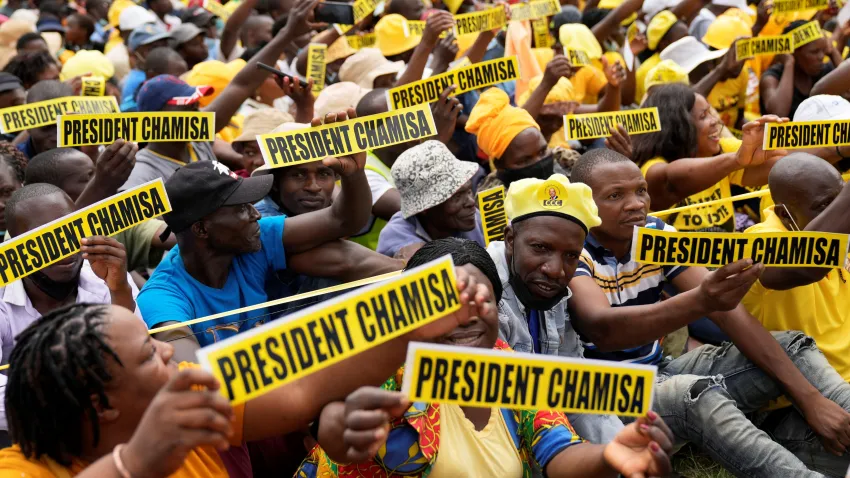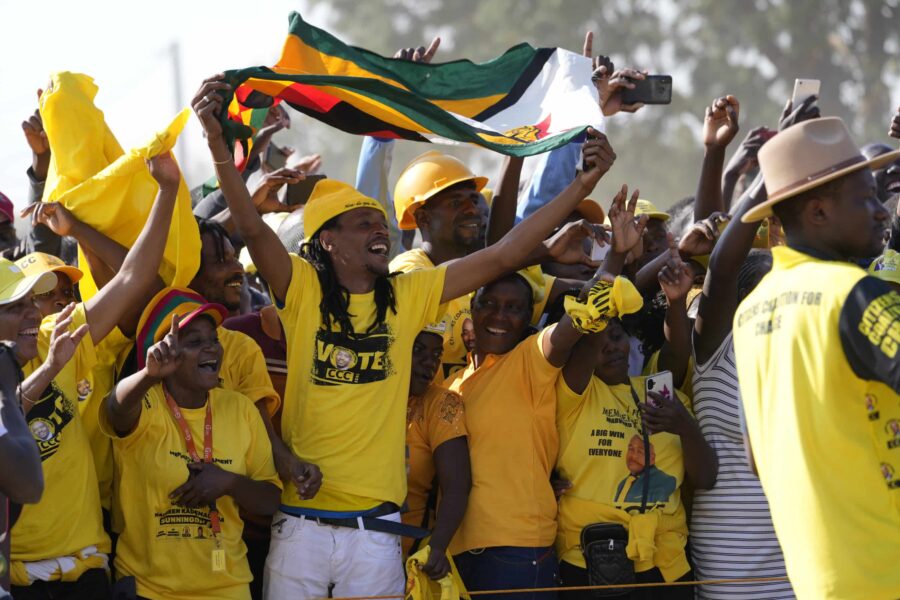 Special for Africa ExPress
Special for Africa ExPress
Angus Shaw
Harare, September 3rd 2023
Winners of elections generally celebrate their jubilation out on the streets. Zimbabwe has seen nothing of the kind since the general elections a week ago.
The silence is deafening, as one commentator put it. The result was a foregone conclusion so what would have been the point in showing joy when nothing has changed, he said.
But there is noise in the corridors of power. The vote is once again entangled in bitter disputes over a result that gave President Emmerson Mnangagwa another five years in office. The 80-year-old incumbent polled just under 53 percent of ballots against 44 percent by opposition leader Nelson Chamisa, a 45-year-old advocate and preacher.
Allegations of rigging, incompetence and bias by the organisers, the state Electoral Commision (ZEC), were quick to appear, alongside the pervasive claims around every past election of lavish spending and intimidation by the ruling party.

Violence was sporadic this time but threats of violent recriminations against perceived opponents after the vote were ever present. The ZANU PF party won 136 seats in the 210-seat parliament chamber against the Citizens Coalition for Change’s 73. One seat has still to be contested because the main candidate died on the eve of polling.
Most observers have conceded that election was generally conducted peacefully but flaws in the entire electoral system remain, throwing into question, of course, whether it was free and fair and wholly reflected the wishes of the people.
For the first time official election observers representing African countries in the regional bloc, the Southern Africa Development Community (SADC), tabled a critical report that angered the ruling Mnangagwa party the most. Brother had turned against brother, traditional African solidarity for individual nations’ sovereignty and law was breached and the head of the SADC delegation, Nevers Mumba, a former Zambian vice president, was a known friend of Chamisa and an opposition sympathiser.
The state-controlled media was also at pains to label him as “a convict” who couldn’t be trusted. Mumba had indeed once been convicted of the minor offence of ‘lying to police’ after a domestic dispute at home in Zambia.
Chamisa’s “Triple C” party immediately rejected the outcome and demanded a new and fair poll. It said Mnangagwa’s subsequent advice to take the issue to court was meaningless given his control over Zimbabwe’s judiciary.
The impasse will continue. Already air force fighter jets have been screaming overhead in rehearsal for a fly past at Mnangagwa’s ceremonial inauguration for a second 5-year term. Successful opposition parliament members say they get little comfort from a new constitutional amendment limiting the presidency to two terms. Robert Mugabe ruled harshly for 40 years.
“The jets are reminding us who is in charge,’’ said one Triple C lawmaker. In a social media post he noted support for his party had soared but it was cheated of victory. “Change is in the air, if not today, if not tomorrow but change will come.”

The muted celebrations for Mnangagwa testify that 70 percent of Zimbabwe’s population were born after independence in 1980. Their moniker “Born Free” has been replaced by “Born to Suffer” in an economy cippled by mismanagement and corruption. “Suffer Continues,” came as a variation this past week.
Overall, the atmosphere is calm but tense. Flea markets and street vending stalls, forcibly closed during campaigning, are back but with nervousness and less vigour for the hustle.
There are reports that losing ruly party candidates are turning on their voters’ betrayal by removing improvements – like water tanks, medication for clinics – that they gave constituents before polling days on Aug 23 and 24. Voting was extended for a second day because of administrative chaos that saw ballot papers in short supply and thousands turned away whose names didn’t appear on the botched voters’ roll.
As it stands, it’s a mood of wait and see. Messages of congratulations to Mnangagwa have poured in from abroad – the latest being from Mahmoud Abbas, president of the State of Palestine who succeeded Yasser Arafat and, as social media point out, has been unrelentingly at the helm for two decades.
Interestingly, Mnangagwa’s vice president has been slow to praise his boss. Former army commander Constantino Chiwenga would usually have been the first to offer congratulations.
This has fanned street talk that the two have grown an intense dislike for each other over the handling of government policy. They certainly haven’t been sitting shoulder-to-shoulder at recent state functions as is customary.
As the ubiquitous taxi driver puts it: “Watch out. There may be another coup down the road.”
A bloodless military coup brought Mnangagwa to power in 2018, embedding the continuous rule of Mugabe’s party in which Chiwenga has always been a powerful loyalist.
Angus Shaw
Do you want to contact Africa ExPress? Send a WhatsApp message with your name and region (or country) of residence to +39 345 211 73 43 and we will call you back. Specify if you would like to be subscribed to the Africa Express Mailing List to receive free news from our online newspaper via whatsapp.
